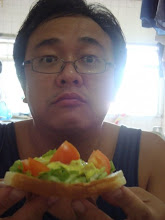
"Singaporeans are very good at doing but not at reflecting." This was the gist of what the visiting professor was purportedly to have said. According to my tutor, the statement was met with stony silence from the Singaporeans present in the meeting that day.
While I think this may be an overstatement, I do believe on the whole majority of Singaporeans, indeed, South East Asians, tend to value action above reflection.
"Think so much for what?" is a comment I frequently get. This is partly, I suspect, due to our immigrant roots. Our forefathers, when they first arrived at these shores, did not survive hardship by philosophising about why the world is so tough or fed their families with wishing thinking about where the next meal would come. My tutor added that our nations (I'm referring to both Malaysia and Singapore) are young. Could this also be partly responsible for the anti-intellectualism so prevalent in our societies?
Despite the ever competitive paper chase I observe there is actually very little learning for the sake of gaining knowledge. Education is a means to an end, and not an end in itself. This endeavour should not then be called 'education' but more correctly mere 'literacy' as Francis Christie explained in her book "Literacy and Schooling" (Christie & Misson, 1998).
While this was necessary in the post war, post colonialism days, where new economies were burgeoning and literate workers were needed as "fodder" for the offices and work places, today the game has changed. Students who are very good at regurgitating facts will no longer be highly valued. And reflecting has become one of the more important tools of assessment of learning. Alvin Toffler, the futurist said, "the illiterate of the year 2000 will not be those who cannot read and write, but those who cannot learn, unlearn, and relearn."
I first encountered this business of reflection when I was doing my Cambridge International Diploma for Teachers and Trainers (CIDTT). Although in the end I got distinctions for writing good reflections for all the four modules, I had failed the third when I became lazy and did not put in enough thought into it and had to redo it. (I got a distinction for the resubmission.) But what I will never forget though was the examiner's comment on the third:
"Reflection too brief, insufficient evidence of learning."
In hindsight, that was the most valuable lesson I learned!
Indeed the reason for this Evening Primrose blog is not some fulfillment of a hidden egotistical bent in me that compels me to shout to the world to tell them what I think. It was at the prodding of my buddy Alwyn who has been encouraging me for ages to start blogging, coupled with my recent reflections on reflecting that made me finally decide to take the plunge. The tutor of one of my courses at NIE this semester, has also made it a requirement for us to submit a "Learning Log." It's essentially the same thing. I have found, despite a difficult start, after several entries, it got easier to write down one's reflection. And I felt this is a good way to discipline myself to pen down my thoughts.
I love the Problem Based Learning philosophy of Republic Polytechnic. I don't get paid extra for saying this, but I really believe this is the way to go for the future of the next generation. One of the things built into the assessment system is to make students reflect on their learning at the end of everyday. Alas, not all students understand the value of their Reflection Journal (or RJ, as it is known) and those who do make an effort often are unable to write with the depth that we look for as "evidence of learning."
When we ended our last lesson of the semester recently one of the task assigned to the class was a recap of what had been learned for the last 15 weeks. I decided to do a "Circle Time", something I learned from Jenny Mosley (check out http://www.circle-time.co.uk/) when I was in England. I ran through the list of all the topics we covered and asked them to share what they have learned.
The students often started by saying something like this:
"I learned that Taboo is about not saying bad things—"
"Wait," I would cut in. "I want to know what YOU learned. Don't tell me just the facts."
"I learned that people should not—"
"Wait,you are still giving me a textbook answer. What did YOU learn?"
I did not want regurgitation but I wanted to know how the learning had changed their lives, how they view things, how they will make decisions differently. Of the three classes I facilitated only one class was able to articulate and share their thoughts and insights. And even then only a third did the talking. (Is there a magic figure here? One third are the thinkers, the others are the doers?)
Upon reflection (pun intended, hahah!) one out of three isn't too bad a ratio. At the very least, it is a start.

Hi there, I chanced upon your blog while googling for information regarding the CIDTT. I'm interested in enrolling in the GIG education centre. Where did you take yours, and care to share your experience?
ReplyDeleteAlso do you know if this certificate is recognised in Singapore -- meaning recognised in Singapore as a teaching diploma -- i.e allows you to gain entry into MASTERS in EDUCATION at NIE (not MOE-schools).
Thanks alot! Please e-mail me at aihuichow@gmail.com.